In a World of Shrinking Size Inclusivity, Eloquii Stands Larger Than Ever
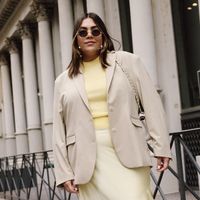
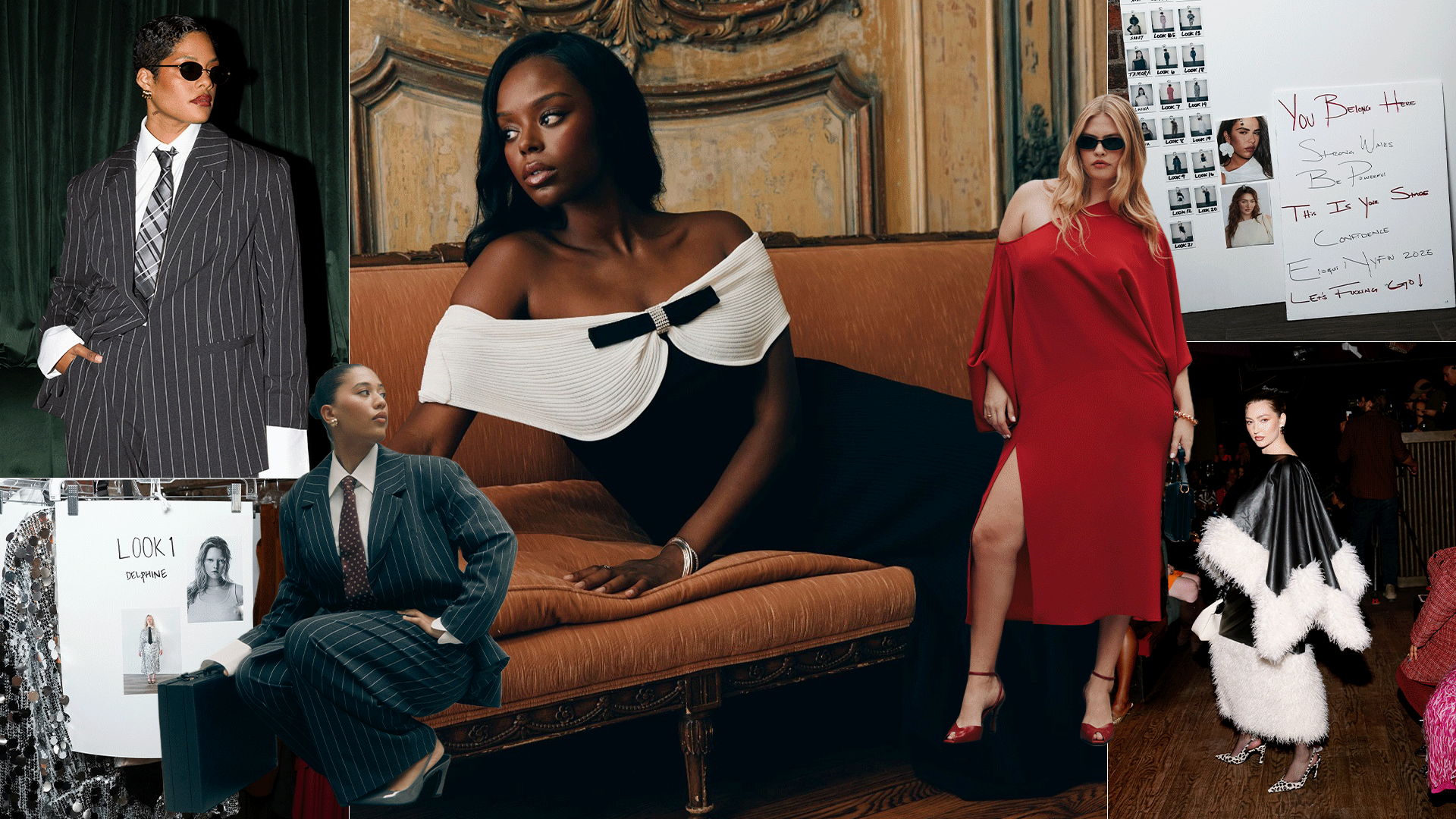
In a slinky, moody bar in downtown Manhattan, models in tailored suits, pillbox hats, and cow-print pony-hair dresses moved to the thrum of croony jazz beats, suggesting a quiet, almost sexy defiance—a fitting soundtrack for a brand reborn. On paper, Eloquii's September fashion show was just another stop on the New York Fashion Week circuit. In practice, it was a quiet revolt, a runway where size inclusivity wasn't a token gesture. It was the entire point. Editors and influencers, nearly all of them plus-size, watched from crushed-velvet banquettes, celebrating a moment for a brand that shouldn't feel radical in 2025, yet during a runway season where size inclusivity has fallen off dramatically, it undoubtedly is.
After more than a decade in the business, American plus-size label Eloquii has been having a comeback that's equal parts revolutionary and refined. While the brand's master plan has been in the works for a while, it's only now that cool fashion people are starting to take notice.
In years' past, Eloquii was a name whispered with a shrug: dependable, sure, but never aspirational. Memories of early 2000s–style peplum tops and cold-shoulder sweaterdresses might still be linked to the label in some consumers' minds, but the current offerings are a far cry from the memes. Founded in 2011 as a side project within The Limited before relaunching as an independent brand three years later, Eloquii has spent more than a decade navigating the fickle currents of plus-size retail. With new capital and Creative Director Yesenia Torres allowed to finally design the label she's always dreamed of, Eloquii is finally hitting its stride.
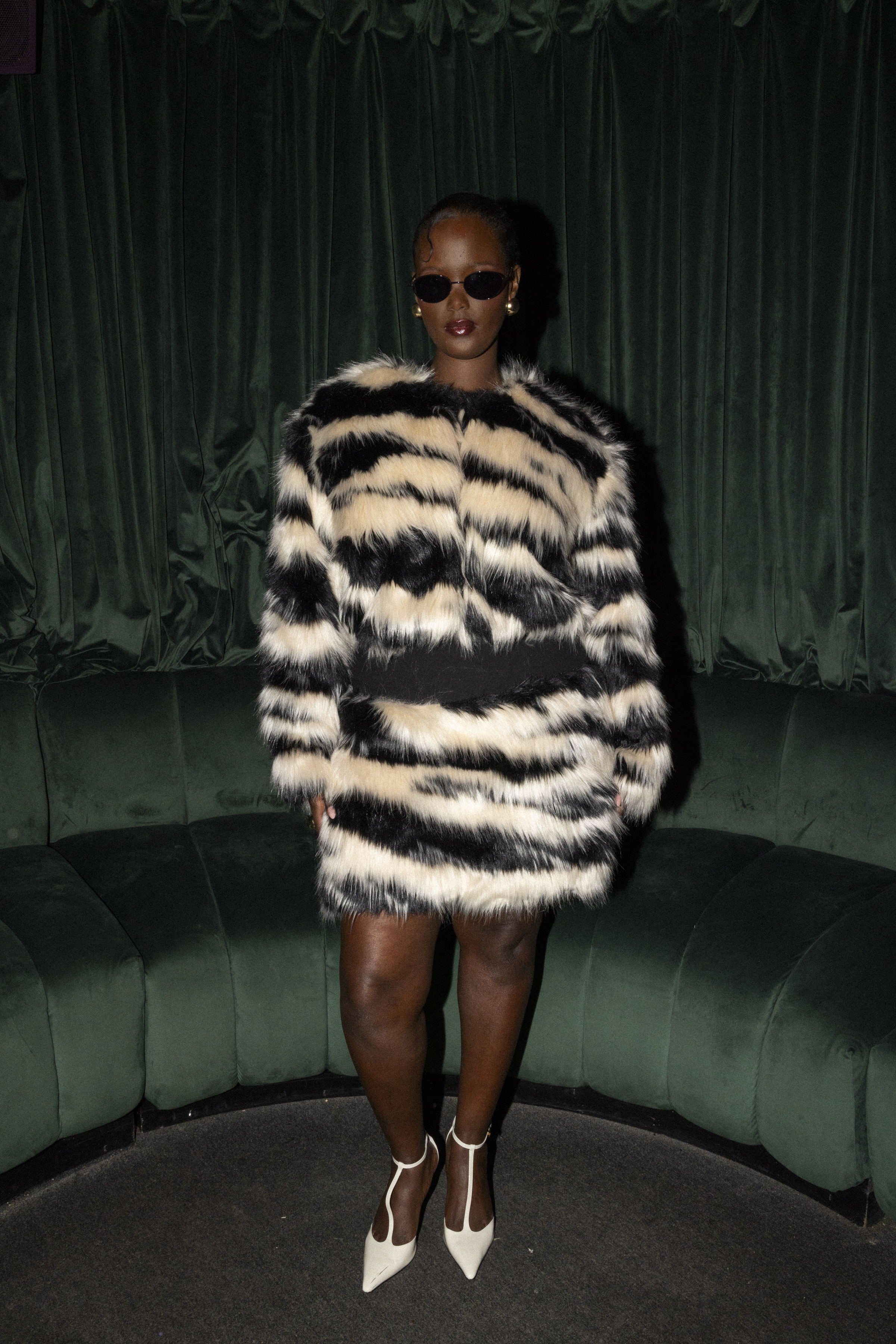
The brand's debut runway show reads less like coincidence and more like defiance. Put against Vogue Business's Spring/Summer 2026 Size Inclusivity Report, the show feels even more timely. In 2025, the fashion industry is moving toward a post–body positivity movement world. Plus-size offerings are shrinking, and thinness is, once again, dominating the cultural mood board.
"Being able to see plus-size women walk down the runway is incredible, but then being able to see the looks and think, 'I would pay so much money for these pieces,'" explains Katie Bradshaw, a New York University master's student, journalist, and content creator. Bradshaw, who had loyally started buying the brand when she was in her senior year of college, feels like she's grown up alongside it. "Seeing how Eloquii has grown so much in these past four years—with [it] now offering so many different styles that so many plus-size women love to wear—is something worth paying attention to," she says.
Eloquii is a rare success story in a moment when size inclusivity is sliding backward. Major brands have slowly pulled extended sizing, beloved indie labels have shuttered, and trend-driven options for plus-size shoppers remain frustratingly scarce. To some, including Bradshaw, Eloquii's resurgence is a glimmer of hope and socially validating. "Often, I'll wear something, and some of my straight-sized friends will say, 'Oh my gosh, where did you get that? I need the link,' and I'm like, 'Well, unfortunately, you can't shop here,'" Bradshaw coyly jokes. "It's something that, as a plus-size woman, I never thought I'd be able to say. Historically, it's always the other way around."
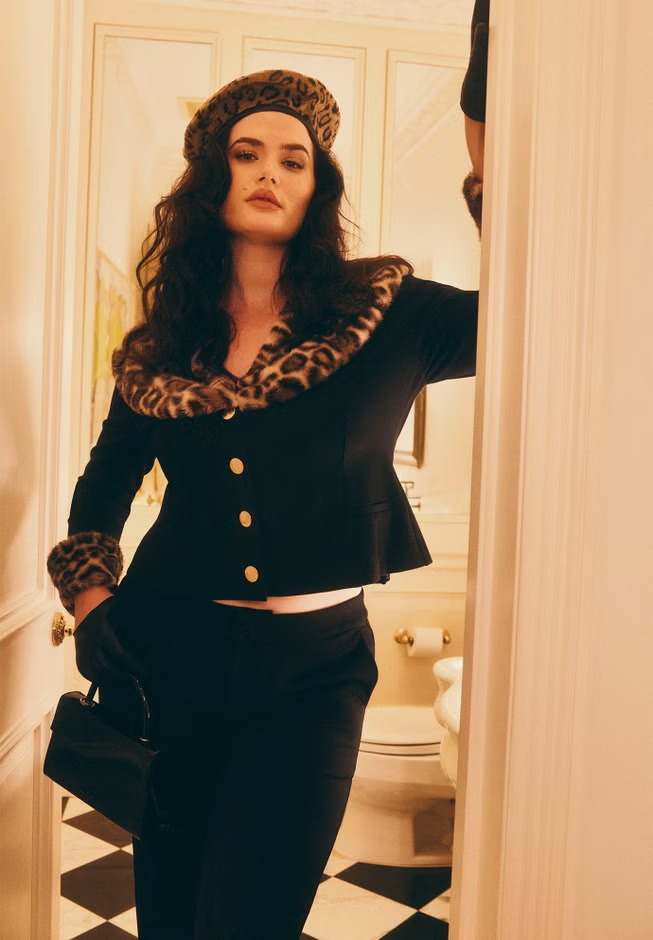
Under Torres's direction as the vice president of design, Eloquii has sharpened its aesthetic, modernized its fit, and reintroduced itself to a community that's long been underserved by mainstream fashion. There are no longer outdated peplum tops, drab oversize fits, and cold-shoulder blouses meant to "hide your problem areas." Instead, you'll now find dozens of garments that feel distinctly elevated and modern. Campaigns feature crafted aesthetics that can rival those of The Row and Khaite, and silhouettes, patterns, and palettes feel like they were plucked directly from the Parisian runways. The payoff may feel sudden, but Torres and her team have been orchestrating this transformation for years. After working in straight-size clothing development for years, Torres stumbled upon the brand and cold-emailed the founders, and the rest was history.
"When I tell people I've been with Eloquii for eight years, sometimes I think it surprises them because they might think I've been with the brand for a few years and just now started to turn it around," Torres admits. "While I'm so happy for people to see the growth we've had, the reality is that, since I started, I've had to fight against the perception of what plus-size fashion really is."
As a plus-size woman, I know what she means. Other inclusive labels might feel cautious or conservative, assuming their customers aren't attuned to social media trends and simply want to dress for comfort or, more pessimistically, hide their bodies. Torres notes that this perception is a deep-rooted trauma, one that's hard to unlearn when you grow up plus-size. It's something she's had to unconsciously unlearn both professionally and personally. Growing up plus-size, she realized that clothes could leave a lasting impression when meeting someone. If she couldn't fit the deeply problematic beauty standards in the Latino community, at least she could have the best outfit on.
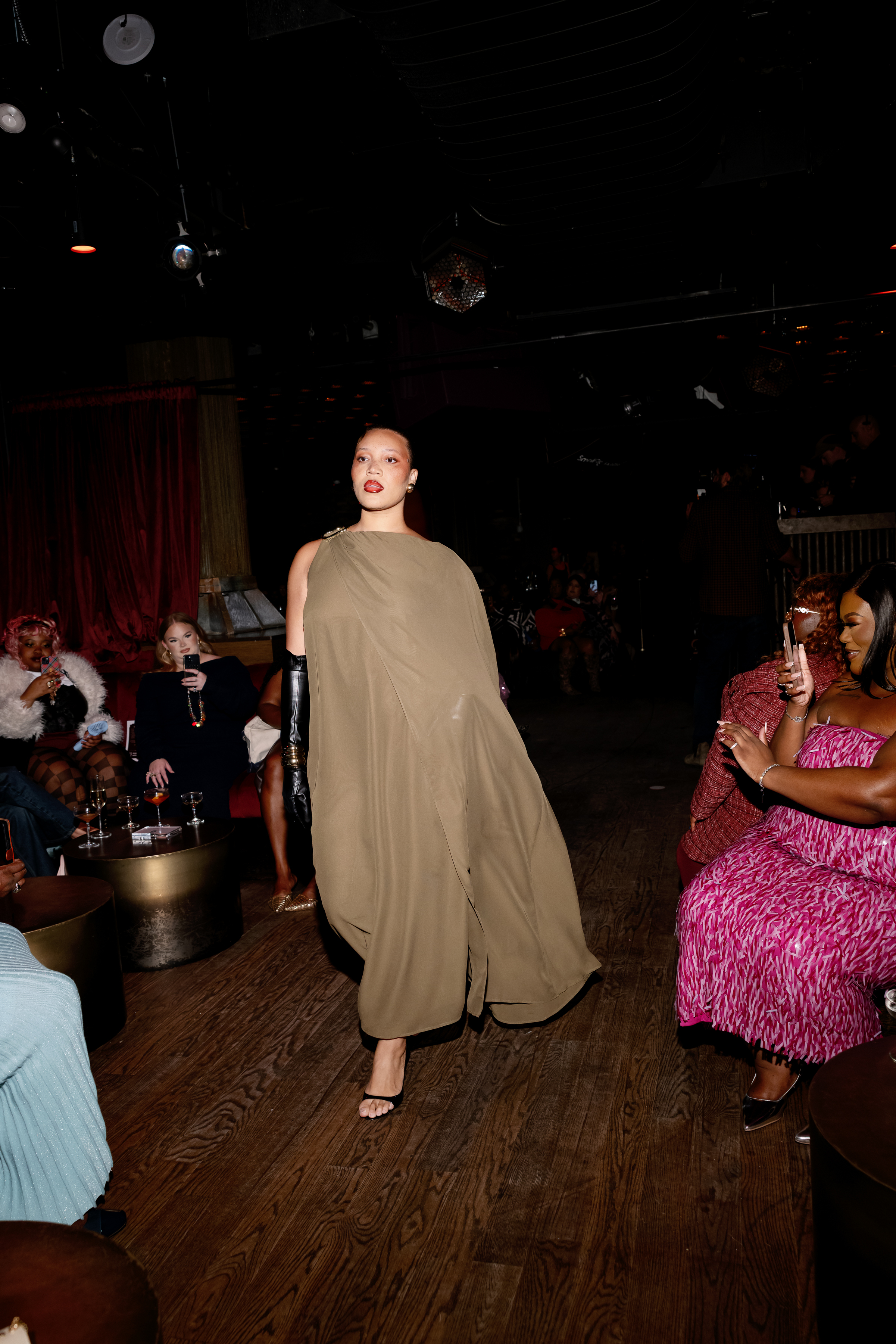
Prior to the body positivity movement of the mid-2010s that popularized models like Ashley Graham, plus-size women were seen as lucky if they were even thrown a bone. "Back then, women were basically shamed, outcast, and were told, for lack of better words, you need to wear a muumuu or sweatpants because that's what they deserve," Torres says. Over the years, she's pushed the boundaries with Eloquii's offering, sprinkling in more and more garments that feel chic and elevated and speak to a fashion-inclined audience each season. What was once a suede jacket or a Prada-esque pencil skirt here or there has transformed into a full-blown collection. Nowadays, nearly every item on Eloquii's line sheet is catered toward the customer who's unafraid to take a risk with their outfit. More importantly, the same customer isn't just admiring the lookbook on Instagram. They're buying the whole collection.
In a year when size inclusivity has quietly fallen off the fashion agenda, Eloquii's resurgence is a reminder that innovation and inclusivity can coexist—and sell. Although exact figures aren't available since the brand is privately held, 2023 (the year the label was acquired by FullBeauty Brands) was the most profitable year in the brand’s history. Eloquii cofounder Julie Carnevale adds that 2025 is on track to beat those numbers. "It's not easy to survive right now, especially as a clothing business, especially one who's in plus-size, so I'm even more proud of these results," Carnevale explains.
She and the team were among the original sellers to FullBeauty Brands, a size inclusivity–focused conglomerate that has provided Eloquii with the financial and organizational support to scale without compromising design. Post-acquisition, the resurgence makes sense: Instead of just surviving, the team can focus on creating new collections, confident the business will endure. "There's a lot of brands who are getting out of plus-sizes or closing them altogether, and we're just doubling down. Not only do we fully believe in it, but we're putting our foot on the gas—watching new brands, acquiring new teams, providing funding," she adds. "It's all part of the magic."
Everyone likes to root for an underdog. Eloquii has survived years of skepticism, financial hiccups, and the casual dismissal often reserved for plus-size brands—a history that makes last month's runway feel like a quiet coup. Vogue Business's Spring/Summer 2026 Size Inclusivity Report showed an unsurprising lack of progress from the industry. Although Eloquii isn't on the official fashion calendar and isn't listed in the report, its presence would not have dramatically skewed the numbers even if it was included. Fashion, at this point, has made it clear that the only thing it hates more than plus-size women is fashionable plus-size women.

"At the end of the day, what most people don't know is that Eloquii is already dressing every single celebrity that's plus-size. They're reaching out to us, and although we aren't on the CFDA calendar, we do all the work that all these other designer brands do, and we get zero credit for it," Torres admits. "For me, it was important that our customer sees themselves on the runway and showing them that they can exist and be catered to in a way that no other runway brand is doing." It's also, frankly, a reality check for the remainder of the fashion industry to remember not everyone is creating clothing for a size 2. "It's like, 'Hi! We exist! We're here, and we belong in the conversation of fashion too,'" Torres adds.
I have grown up navigating a world built for thinner bodies, so watching Eloquii's evolution is more than a trend. It's a validating reminder that fashion isn't just about clothing. It's about who gets to exist, be seen, and be celebrated. There are whispers about FullBeauty Brands' high-end luxury lines, increased budget for influencer trips, and acquisition of other plus-size brands to offer even more clothing to women across America. Everything is aimed at making sure the right people see the clothes and feel seen themselves.
Clearly, the effort is paying off. Engagement is booming, sales are up, and the combination of carefully curated collections and audience-focused community strategy have put Eloquii in a rare position: growing while competitors retreat. Numbers tell only part of the story, though. The runway, the campaigns, the social feeds—they're proof that fashion can be inclusive without compromise. "Our customer exists everywhere, and you just have to believe in them, and you just have to really understand them," Torres says. "All women have insecurities, whether you're straight-size or plus-size, but all women want to look beautiful. Just us being able to validate that for our customer has really kept us going."
Small but mighty, Eloquii has turned its niche into a movement. In a fashion world that too often sidelines size, the brand proves that inclusivity can be stylish, profitable, and unapologetically bold. Women are finally getting to exist in the fashion conversation on their own terms, and for Eloquii, that conversation is just getting started.
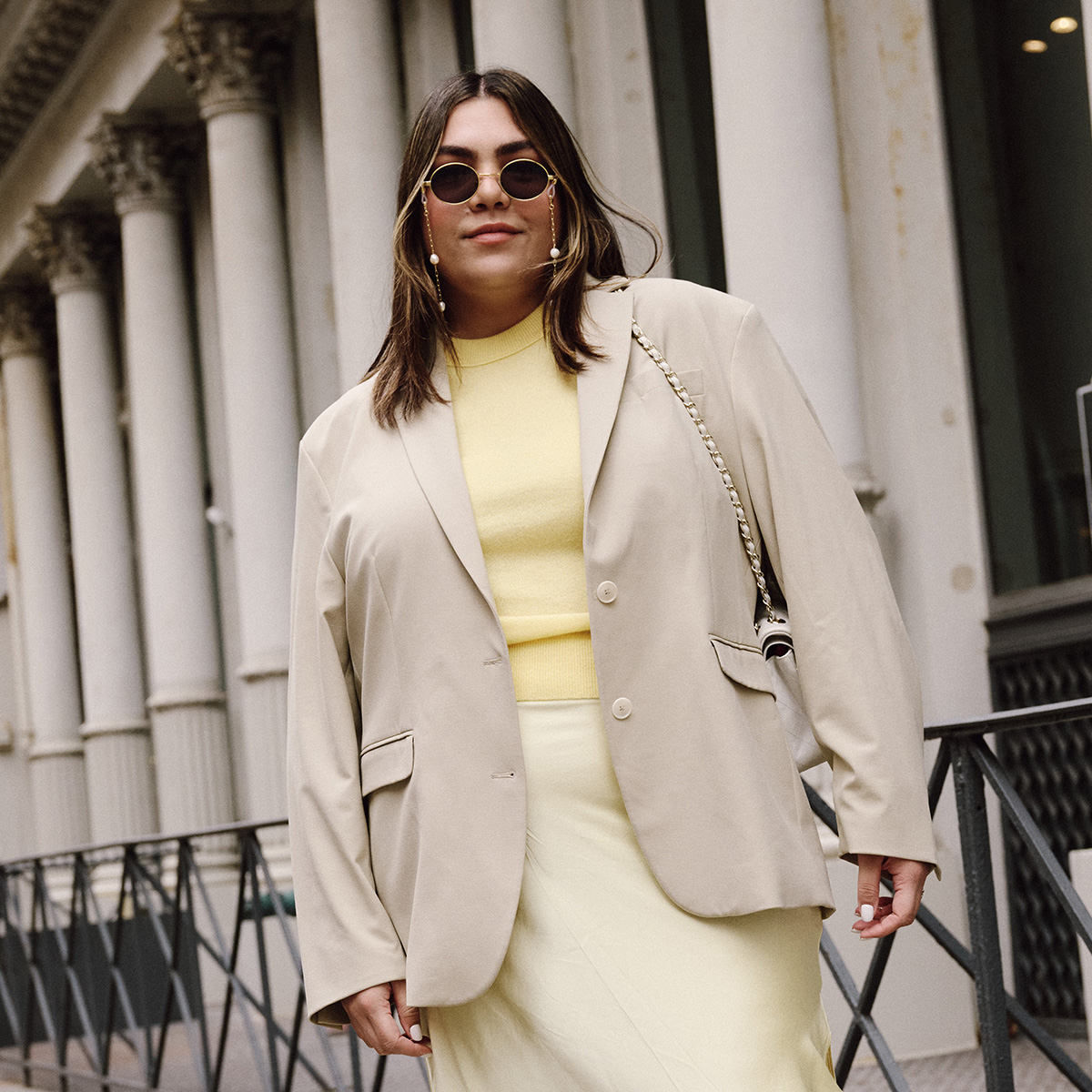
Ana Escalante is an award-winning journalist and Gen Z editor known for her sharp takes on fashion and culture. She’s covered everything from Copenhagen Fashion Week to Roe v. Wade protests as the Editorial Assistant at Glamour after earning her journalism degree at the University of Florida in 2021. At Who What Wear, Ana mixes wit with unapologetic commentary in long-form fashion and beauty content, creating pieces that resonate with a digital-first generation. If it’s smart, snarky, and unexpected, chances are her name’s on it.